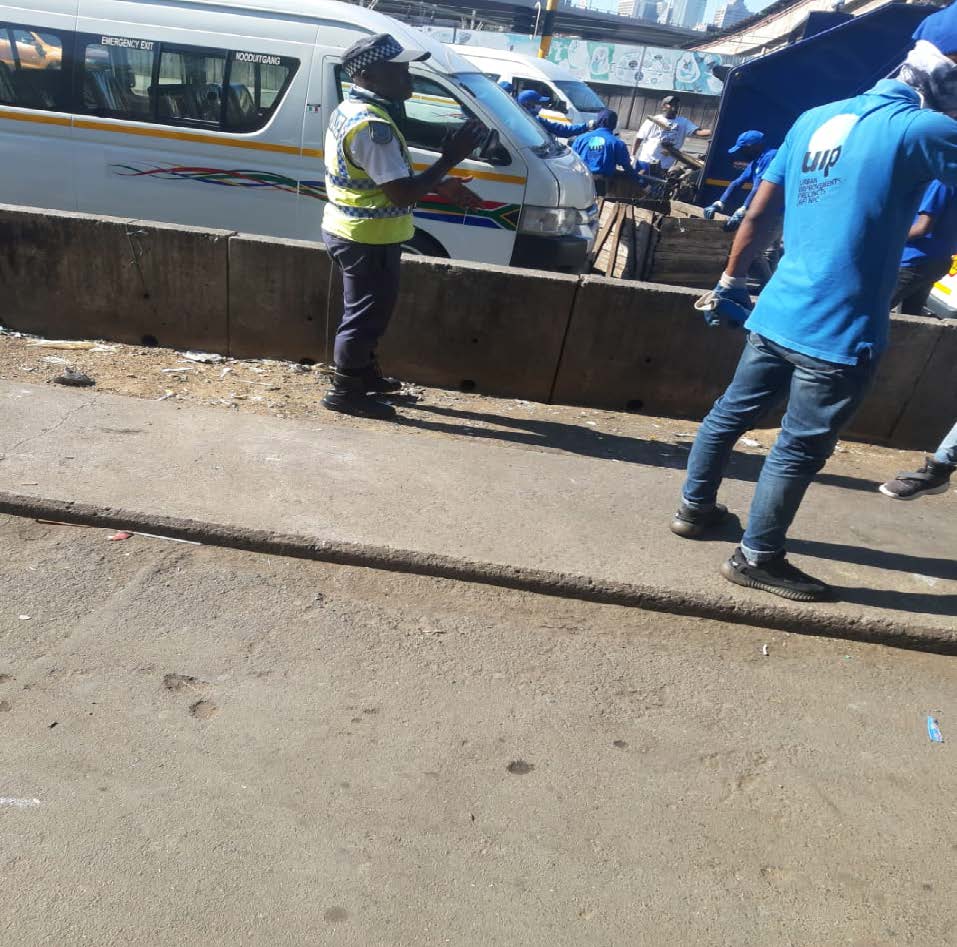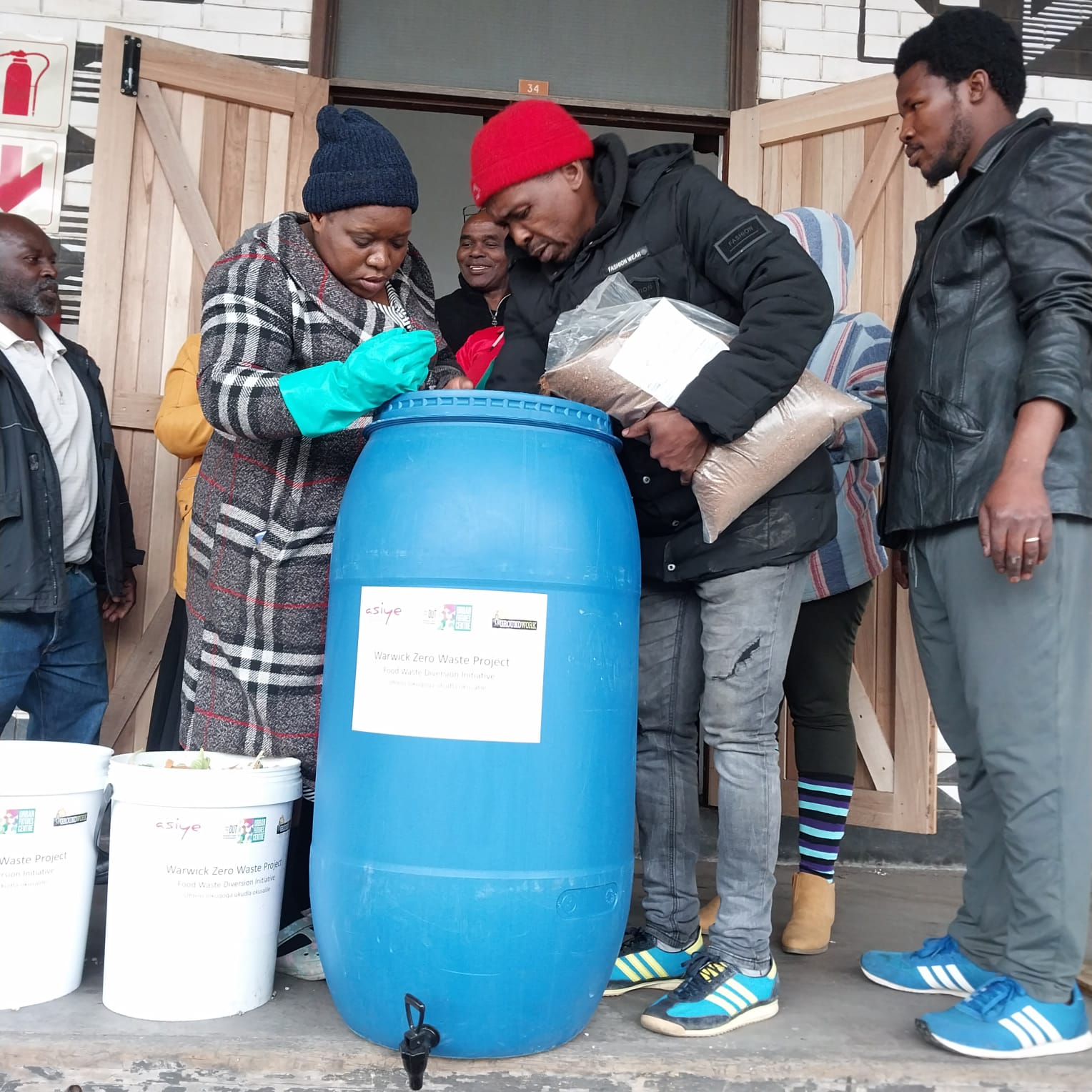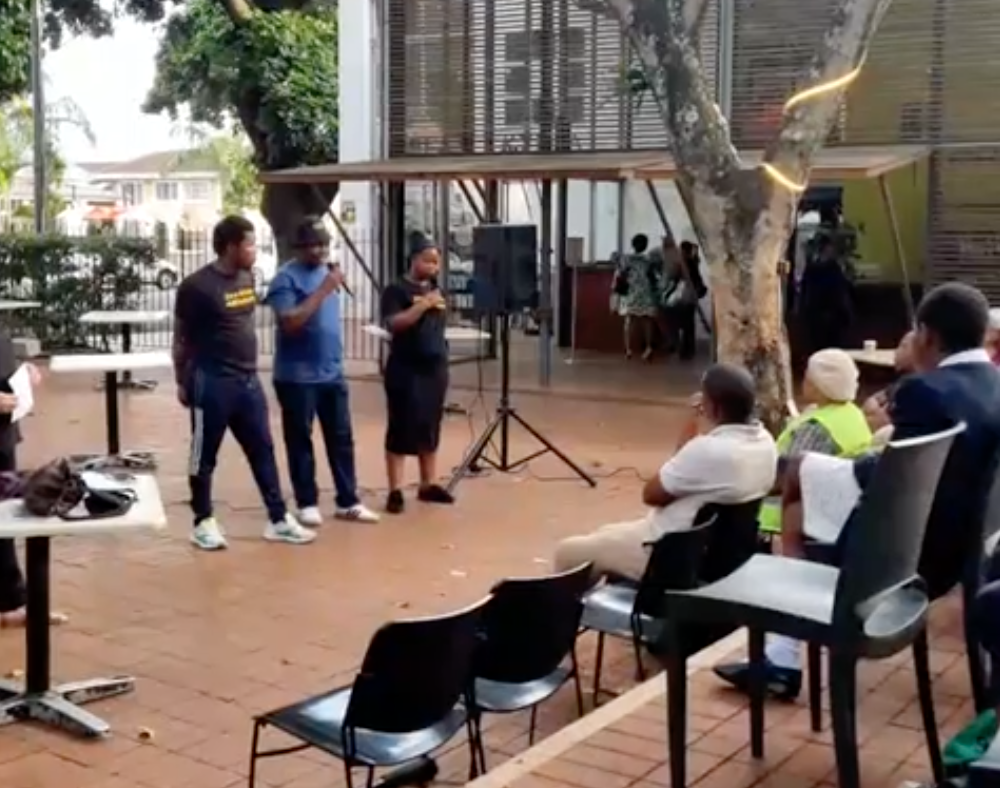On Thursday, October 26, 2023, Asiye eTafuleni (AeT), alongside groundWork and the Urban Futures Centre, hosted “Towards Zero Waste” at KZNA Gallery. Glenwood residents were invited to come and learn ways of reducing their carbon footprint by managing their household waste. The stars of the event were the two dozen or so Waste Pickers who began by introducing themselves, how long they’ve been doing this work, and the communities they serve. Then, they led a demonstration educating the audience on which waste products are recyclable and their monetary value. This two-hour event sought to build bridges between Waste Pickers and residents, the former being an often stigmatized, laborious, and dangerous position, yet integral to mitigating climate change.
There was a performance by Mpume Mthombeni, who, through storytelling, portrayed the plight but pride of the average Waste Picker. As soon as her performance began, the venue came alive: waste pickers whistled and cheered throughout. It became clear that she served as their mouthpiece as she told their stories, switching flawlessly between English and isiZulu. And how could they not with such inspiring words: “Where you see rubbish, I see opportunity… Where you see waste, I see bus fare…Why do they chase us away when we are picking through their rubbish bins? We are helping them. We are doing the jobs they would never do for themselves… We know what we are doing is fighting against climate change.”
Warwick Zero Waste Project began in 2020 to create and support “innovative, low tech, sustainable ways to reduce waste in the inner city, focusing on Warwick Junction in Durban.” The project has multiple initiatives that address climate change and adaption and is led by informal workers at the Warwick Markets known as “Zero Waste Champions.” Their primary responsibility is to promote behavior change among their peers around waste practices and to pilot zero-waste interventions. They lead the charge by providing pissoir/urinals to reduce public urination, using bokashi composting to reduce food waste, and organizing street cleanings and pothole repairs. There are seven Zero Waste Champions who were recruited and then interviewed for their positions because they proved to be leaders in their communities and they had been involved in previous AeT projects. Once they were recruited, these traders had three workshops with local Waste Pickers so they could discuss common interests and brainstorm ideas for change. They also had a site visit at the Marianhill landfill so they could understand how compostable materials flood landfills. Zero Waste Champions currently have a meeting twice a month but meet every Thursday for bokashi and are paid a stipend for their time and expertise.
Halfway through the event, dedicated Zero-Waste Champions, Slindile Dlomo and Ayanda Sokhanyin, presented their Zero Waste initiatives. Ayanda has worked at the David Webster Market selling street chips and electrical appliances for the last 17 years and has been a Zero Waste Champion for two. Slindile has worked at the Bovine Meat Market for the last 15 years, where she sells cow head meat and dumplings and has been a Zero Waste Champion for 9 months. During the presentation, Ayanda described how rampant public urination was, and how it made certain areas of the market smell, which in turn affected business. However, he explained that with the implementation of pissoirs, he is now able to direct people to appropriate places to go to relieve themselves. He feels empowered knowing that his work as a Zero Waste Champion is improving the behaviors of his colleagues and customers.
Slindile expressed similar experiences witnessing unfavorable hygienic practices at the markets. Before the implementation of the Zero Waste projects, the Bovine Market had a reputation for being poorly maintained, which led to a feeling of shame. Informal workers had no proper way of disposing of their food waste. But now, with the bokashi project, cooked food waste generated by the market is collected and composted using the bokashi method. As liaisons, both Ayanda and Slindile pride themselves on being able to teach their colleagues about hygienic practices and reduce the stigma associated with the markets.
Watching their presentation, they came across as confident and knowledgeable about Zero Waste and climate change. A month after the event, I held a debrief and interviewed them about their experience being Zero Waste Champions and the Zero Waste interventions: were they as cool, calm, and collected as they looked? They explained that it was not an act. They truly felt confident presenting because they were able to share with others “stuff that they do and stuff that they know.”
They explained that their positions as Zero Waste Champions can be challenging at times. For example, when they collect other people’s waste, others assume they have ulterior motives: What are you doing? What are you doing to do with my trash? Furthermore, Ayanda explained that when he approaches people about urinating in public, they question his authority: Who are you to tell us what to do? Convincing people to change their ways and getting them on board is the most difficult aspect of the job. But as time went on, they both grew more assertive and were about to recruit their colleagues in Zero Waste’s project activities by appealing to them as businesspeople and warning that “commuters and customers will see [the markets] as a dirty space and will not want to spend their time or money here.”
Being a Zero Waste Champion has empowered them both because the knowledge they learned from the workshops before they could be deemed “Champions” (composting, waste disposal, hand-washing, mitigating climate change), they bring to their own homes and communities. Being a Zero Waste Champion has impacted their lives positively. It changed how they view nature and the environment and how they handle things back home— knowledge empowers.




